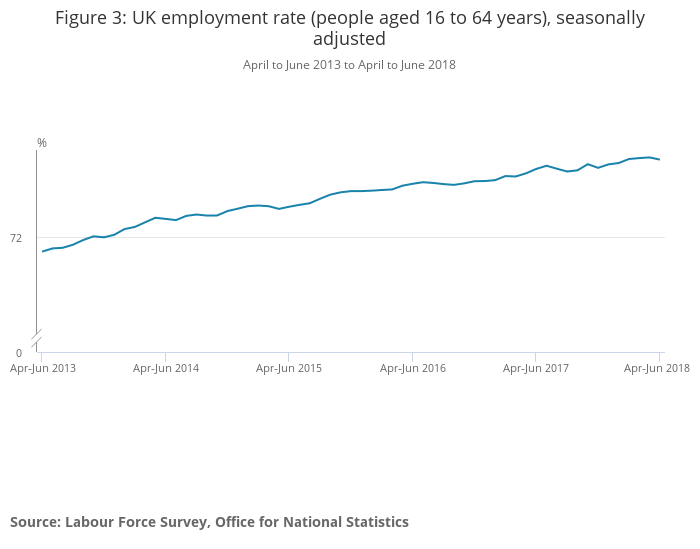Work TV
Watch our TV Channel dedicated to the ‘World of Work’. Explore our video library for informative videos featuring career opportunities at leading companies, franchising opportunities, further education and recruitment professions and their services.
Simon Collyer
Nine Times More People Sanctioned Under Universal Credit
Statistics have been released by the government detailing how many people who need support from benefits are being sanctioned. This means having their financial support cut or stopped entirely because they’re not able to do the things that are being asked of them, such as attend appointments with a work coach or Jobcentre Plus advisor.
Universal Credit (UC) is gradually replacing a combination of other benefits, including Employment and Support Allowance (ESA), provided to those who aren’t currently able to work due to a mental and/or physical health problems, and Jobseekers’ Allowance (JSA) provided to people looking for paid work.
The figures from the Department for Work and Pensions (DWP) show:
Sanctions under Universal Credit are at least nine times higher than the benefits it is replacing. In the last period for which data is available 2.8 per cent of people saw their benefits drop due to a UC sanction compared to 0.3 per cent of people on JSA and 0.1 per cent of people on ESA.
Disabled people receiving ESA are over three times more likely than people in receipt of JSA to still be receiving benefits six months after a sanction - 85 per cent of people receiving ESA compared to 27 per cent people receiving JSA.
ABC Comment: Have your say below?

The Social Market Foundation is Undertaking a Sanctions Review
The Social Market Foundation is currently undertaking a major research project looking at benefit sanctions in the United Kingdom, updating and expanding the Independent Review of Sanctions that they undertook for Government in 2014.
This research will build on recent reports including the Oakley Review, the NAO report on benefit sanctions, and a wide range of research by academics and representatives of claimants. This project is supported by the Oak Foundation.
Our aim is to produce an interim report in Autumn of 2018, with a final report in Spring 2019. We will also produce a set of key metrics that can be tracked in order to judge whether the sanctions and conditionality system are improving, which we will update over the following two years as new data becomes available.
The UK’s system of conditionality and benefit sanctions forms a central part of the social security system. In recent years, the level of sanctions have been significantly increased – but this escalation in severity has not been accompanied by a similar increase in the understanding of the impacts and knock-on effects of sanctions.
We know very little about the fairness or effectiveness of a central part of the social security system and, in particular, how recent changes and reforms have impacted on this. This project intends to fill those gaps. We are undertaking several strands of research and engaging with stakeholders in the social policy space, including those affected by conditionality.
ABC Note: If you would like to know more about the progress of this project, please contact the Social market Foundation via: This email address is being protected from spambots. You need JavaScript enabled to view it..
News
SMF issues call for evidence on benefit sanctions
The Social Market Foundation has issued a call for evidence on the benefit sanctions system in the UK. Academics, policymakers, third sector bodies, claimant representative groups, and claimants themselves are all invited to contribute. The call for evidence closes on Friday September 14th, and can be found here.
More information on the project is available at:http://www.smf.co.uk/making-sense-of-sanctions/
ABC Comment Have your say below:

Alcohol Related Deaths Rocket in Northern Ireland
Following the figures released today that show that the number of alcohol-related deaths in Northern Ireland is the highest on record, SDLP Health Spokesperson Mark H Durkan MLA has said that we need to raise awareness of the pitfalls of alcohol misuse and abuse.

Image: Mark H Durkan MLA
SDLP Health Spokesperson, Mark H Durkan MLA said:
“The recent figures surrounding alcohol-related deaths here are extremely concerning. Alcohol misuse has been identified as a significant public health and social issue in Northern Ireland over many years but the fact that alcohol-related deaths are at an all-time high, highlights the glaring failures within our health service.
“These statistics serve as a stark reminder of the crippling effects of alcohol on individuals, families and society in Northern Ireland. Sadly, we see the cost of alcohol abuse and addiction everyday: the cost to individuals' health; the huge financial cost to our struggling health service; and the massive societal, human cost of family breakdown and even homelessness.
“We as a society need to wake up to alcoholism in the city and our ‘drinking culture’. People need to challenge their perceptions of what alcoholism looks like – in many cases it is hidden behind closed doors. We need to promote safe drinking and raise awareness of the pitfalls of not drinking sensibly.
“Political parties here had all agreed on the benefits of minimum unit pricing however, in the absence of an Assembly this cannot be progressed.”
ABC Note: The Social Democratic and Labour Party is a social-democratic and Irish nationalist political party in Northern Ireland. Between 2001 and 2016, more than 3,500 deaths in Northern Ireland were attributed to alcohol.
ABC Comment: have your say below:
Northern Ireland Labour Market Statistics
Labour Market Statistics Published
The labour market statistics were published today by the Northern Ireland Statistics and Research Agency.
Key points
Labour Force Survey (LFS) unemployment increased over the quarter and decreased over the year
The latest NI seasonally adjusted unemployment rate for the period April-June 2018 was 3.8%. The unemployment rate increased by 0.6 pps over the quarter from a record low and decreased by 1.5 pps over the year (from 5.3%). The annual rate change was statistically significant, i.e. the recorded changes exceeded the variability expected from a sample survey of this size and would, therefore, likely reflect a real change.
The NI unemployment rate (3.8%) was below the UK average of 4.0% and was the fourth lowest rate of the UK regions (higher than the South West, South East and East). NI unemployment was lower than the European Union (7.0%) and the Republic of Ireland (5.3%) rates for May 2018.
Figures for April-June 2018 estimated that 63.1% of those unemployed in NI were long-term unemployed (i.e. unemployed for one year or more), compared to 26.7% in the UK.
The youth unemployment rate (those aged 18 to 24 years) for April-June 2018 was 9.4%, down 3.2 pps over the year. The UK average rate was 9.8%.
LFS employment rate and inactivity rate both decreased over the quarter and increased over the year
There was a decrease (0.4 pps) in the employment rate (69.3%) over the quarter and an increase (0.1 pps) over the year. The change in the employment rate was not statistically significant over the quarter or the year.
The economic inactivity rate (27.9%) decreased over the quarter (0.1pps) and increased (1.0 pps) over the year. The changes over the quarter and year were not statistically significant.
NI Claimant Count (Experimental Series) decreased over the month
Universal Credit was introduced in NI in September 2017 replacing income-based Jobseekers Allowance for new claimants. On the July claimant count reference date Universal Credit was available in 21 out of 35 Job Centres in NI.
In July 2018, the seasonally adjusted number of people on the claimant count (which includes some out-of-work claimants of Universal Credit) was 28,100 (3.1% of the workforce). This represents a decrease of 400 from the previous month’s revised figure.

Confirmed redundancies increased over the year
The number of confirmed redundancies (2,907) in the most recent 12 months is 30% higher than in the previous 12 months. NISRA, acting on behalf of the Department for the Economy, received confirmation that 133 redundancies took place in July 2018.
Commentary
- The most recent results mark the fourth consecutive quarter of historically low unemployment rates in Northern Ireland. At 3.8% the April-June unemployment rate is above the record low reported for the previous quarter and significantly below rates one year ago. While the unemployment rate is low, the number of long term unemployed remains high (at over three fifths of the unemployed).
- The employment and inactivity rates both decreased over the quarter and increased over the year. At 69.3% the employment rate is significantly above rates estimated in 2013 but remains below the UK (75.6%) and the lowest of the UK regions. The economic inactivity rate (27.9%) is similar to rates 5 years ago and continues to be the highest of the UK regions.
- The improvements seen in the local labour market over recent quarters are similar to that of the UK labour market which is reporting one of the highest employment rates and the lowest unemployment rate on record. In contrast to the NI experience, the UK results show low levels of economic inactivity.
ABC Comment: have your say below:

Numbers in Work Still Growing Say ONS
“The number of people in work has continued to edge ahead, though the employment rate was unchanged on the quarter. However, the number of vacancies is a new record high, while the unemployment rate is now at its lowest since the winter of 1974-75.”
“For the first time since the ONS started tracking ‘zero-hours’ contracts, we’ve seen a substantial fall in the number of people on one in their main job.”
“The growth in employment is still being driven by UK nationals, with a noticeable drop over the past year in the number of workers from the so-called ‘A8’ eastern European countries in particular.”
The Laour Force Survey:
Estimates from the Labour Force Survey show that, between January to March 2018 and April to June 2018, the number of people in work increased, the number of unemployed people decreased but the number of people aged from 16 to 64 years not working and not seeking or available to work (economically inactive) increased.
There were 32.39 million people in work, 42,000 more than for January to March 2018 and 313,000 more than for a year earlier.
The employment rate (the proportion of people aged from 16 to 64 years who were in work) was 75.6%, unchanged compared with January to March 2018 but higher than for a year earlier (75.1%).
There were 780,000 people (not seasonally adjusted) in employment on “zero-hours contracts” in their main job, 104,000 fewer than for a year earlier.
There were 1.36 million unemployed people (people not in work but seeking and available to work), 65,000 fewer than for January to March 2018 and 124,000 fewer than for a year earlier.
The unemployment rate (the number of unemployed people as a proportion of all employed and unemployed people) was 4.0%; it has not been lower since December 1974 to February 1975.

There were 8.73 million people aged from 16 to 64 years who were economically inactive (not working and not seeking or available to work), 77,000 more than for January to March 2018 but 31,000 fewer than for a year earlier.
The economic inactivity rate (the proportion of people aged from 16 to 64 years who were economically inactive) was 21.2%, higher than for January to March 2018 (21.0%) but slightly lower than for a year earlier (21.3%).
Latest estimates show that average weekly earnings for employees in Great Britain in nominal terms (that is, not adjusted for price inflation) increased by 2.7% excluding bonuses, and by 2.4% including bonuses, compared with a year earlier.
Latest estimates show that average weekly earnings for employees in Great Britain in real terms (that is, adjusted for price inflation) increased by 0.4% excluding bonuses, and by 0.1% including bonuses, compared with a year earlier.
ABC Comment: Have your say below:

PM Unveils £100m Fund to Address Homelessness
Theresa May has unveiled a £100m government fund in an attempt to eradicate rough-sleeping in England within the next decade.
It comes as James Brokenshire, the communities secretary, admitted that efforts to tackle homelessness had “not been good enough”, with estimates suggesting as many as 4,751 people sleeping rough on any given night in the country.
He said the government’s homelessness strategy – to be launched on Monday – will offer help to those with mental health problems and addictions, domestic abuse victims, those leaving prison, and will set about researching the scale of LGBT+ homelessness.
James Brokenshire quit the cabinet to have lung surgery. He began the year not knowing whether he had a future, let alone one in politics. In January, James Brokenshire left his cabinet post as Northern Ireland secretary after being diagnosed with lung cancer. The non-smoker had been in the job for less than 18 months when his world turned upside down.
Having recently watched his father die from pancreatic cancer, the news was a brutal wake-up call for the fitness fanatic as he was forced to face his own mortality. But today he has come a long way since the “dark times” after his diagnosis and is now heading the campaign to bring an end to homelessness.

Image FRANCESCO GUIDCINI: James Brokenshire at the Home Office
ABC Comment: Have your say below:

Supported Housing Gets Housing Benefit Support
Government has announced its plans for the funding of supported housing.
The plans reveal that supported housing, including refuges and all forms of short-term supported housing, will be funded by housing benefit and kept outside of the Universal Credit system.

Image: Cllr Izzy Seccombe.
Responding to the Government’s announcement on supported housing, Cllr Izzy Seccombe, Chairman of the Local Government Association’s Community Wellbeing Board, said:
“This announcement will give councils and housing providers the certainty to sustain and invest in supported housing for some of the most vulnerable people in our communities.
“A sustainable funding model for supported housing is critical to ensuring councils can reduce homelessness and help older and other vulnerable people.
“It is, however, crucial that councils have the leading role in overseeing and ensuring the provision of housing for vulnerable groups is good quality, value for money, and fits in with the wider local services offered in places.
“We look forward to working with the Government and our housing and care partners to ensure that the future of supported housing best achieves our ambitions for communities.”

Image: Kit Malthouse MP.
Housing Minister, Kit Malthouse MP, said: “Protection of the most vulnerable has always been our primary concern, and following our consultation, the case for keeping supported housing in the welfare system became clear.
Minister for Family Support, Housing and Child Maintenance, Justin Tomlinson MP, said: “We are committed to ensuring that vulnerable people have access to the supported housing they need to live safely and independently.
ABC Comment; Have your say below:

Prospect of Large Rent Rises Say the Royal Institution for Chartered Surveyors
Today comes the news that rents could shoot up 15% by 2023 as the supply of new rental properties wanes.
A survey by the Royal Institution for Chartered Surveyors suggests tax changes that came in last year have rendered Buy-to-Let investments less profitable.
RICS says policymakers should consider the way in which the private rental sector is regulated.
The volume of rental property has declined over the past two years.
ABC Comment. Are rents rising too much. Have your say below:

US Jobs Growth Continues
The number of unemployed people decreased by 284,000 to 6.3 million in July 2018, and the unemployment rate edged down to 3.9 percent. Since July 2017, the number of unemployed has decreased by 676,000, and the unemployment rate has declined by 0.4 percentage point.
The number of long-term unemployed (those jobless for 27 weeks or more) was 1.4 million in July and accounted for 22.7 percent of the unemployed.
ABC Comments, Have your say below:

ABC Founder Seeks a Fully Independent Enquiry Into Essex Police Maladministration
Simon Collyer, Founder of the ABC is appealing to the Independent Office for Police Conduct, to have a fully independent investigation into Essex Police maladministration.
++++
A Colchester Civil Rights campaigner Simon Collyer has been officially excused from doing Jury Service, after the Jury Central Summoning Bureau learned of Mr. Collyer’s battle to have an independent external police force investigate Essex Police, the Police Fire & Crime Commissioners PFCC (Roger Hirst, Cons.) the Essex Judiciary and Chelmsford County Court.
My Collyer’s issue started in 2014 when he exceeded the speed limit of 30mph, by 7 mph twice on two days just three days apart at 07:30 AM in the morning. The location was at the bottom of an incline next to Colchester Crematoria, Mersea Road - the site of an infamous speed camera. It was an honest mistake, said Mr. Collyer, who had just returned to driving after living in South Africa for several years. Mr. Collyer pointed out, in mitigation, he was ‘heads-up’ avoiding potholes, having suffered a recent tyre blow-out.
Mr. Collyer was offered the chance to take a Speeding Awareness Course, which could have meant he accumulated no points on his license. The contractual terms in writing from the Police state clearly that the course must be paid for on booking. The problem was that the telephone number for booking a course given out by the Police, was that of Essex Highways that offered ‘easy payment instalment terms’ but without putting anything in writing.
Councils, Mr. Collyer believes are not bound by the Consumer Credit Act, and not putting anything in writing caused confusion. ‘The Police have since amended their documentation’ said Simon. When Mr. Collyer decided to wait and pay in one go he found that the documents had been sent back to the police by Essex Highways. He could no longer take the Speeding Awareness Course and would therefore have points on his license.
Further research showed that Essex Police was taking payments via a National Policing Improvement Agency (NPIA) website, even though the organization [the NPIA] was a government quango and not the police, and furthermore had been wound-up in October 2013 by the government, a year before these speeding incidents. ‘This could potentially mean a lack of Data Protection for Essex motorists’ points out Mr Collyer.
A case was heard without Mr. Collyer being present and then heard on the spot on another date without any time for preparation, when Mr. Collyer went in to sign a Statutory Declaration. Mr. Collyer pleaded guilty, as he had already done so in writing when he signed the police contract to take a Speeding Awareness course. Mr. Collyer’s later appeal was dismissed by Chelmsford Magistrates Court as he had pleaded guilty, but the Court recommended that Mr. Collyer sue the Chief Constable of Essex in a Civil Court.
Mr. Collyer lost that case, as a ‘litigant in person’ he had not included all the Police documentation in his ‘bundle’ believing the police would present these items.
There then followed a year-and-a-half saga when three appeals which were sent in by registered post and all went missing. Mr. Collyer’s right to appeal was dismissed by a judge on a fourth attempt, after his MP Will Quince became involved as he did not have a transcript of the original hearing, even though the Court transcribers had failed to produce a transcript, despite four months’ notice and several reminders.
Mr. Collyer then tried another tack and made a complaint to Roger Hirst (Cons) the Essex Police, the Police Fire & Crime Commissioners PFCC at a Colchester Town Hall meeting. Twice Mr. Hirst refused to take this complaint forward until a complaint was made about the Commissioner, to the Independent Office for Police Conduct who upheld Mr. Collyer’s complaint and ordered that this matter be officially recorded. Essex Police have since argued that they don’t need to investigate a complaint which is over a year old.
Mr Collyer then changed gear again and the sued Essex Highways, the Polices ‘agents’ for taking bookings and this time in a case held outside Essex, he won.
Simon Collyer is now lobbying the Independent Office for Police Conduct and his goal is to have a fully independent Police Force to investigate this matter, not just with Essex Police, but also, he wants the police to investigate the role of the Essex Police Fire & Crime Commissioners PFCC and that of Chelmsford County Court and Judiciary.
‘An A Level law student could see straight away that the Essex Police and their agents Essex Highways were in the wrong’ says Simon. ‘The public looking at these events might feel there has been an attempt to cover up police mistakes, fearful perhaps that other people might also complain’. ‘The Essex Police Fire & Crime Commissioners PFCC should be holding the Police to account not blocking complaints’ says Simon.
‘I hope finally we will have an independent police investigation, by a police force with no connections to Essex, who will come in and look at the facts, free from local influence. ‘That is what I have asked from the Independent Office for Police Conduct, and that is what the public deserves in order to to have faith in our system of justice’ says Simon.

Image: Essex Police are more interested in protecting there own image than serving the public, claims Mr. Collyer .
ABC Comment: What are you views? Have your say below:
























